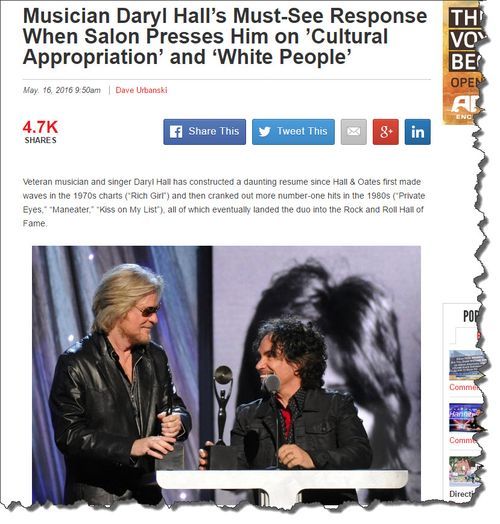Musician Daryl Hall of Legendary Hall & Oates Unloads on Interviewer over ���Cultural Appropriation���
Musician Daryl Hall, one-half of the now-legendary pop duo Hall & Oates, was asked to address���from a musical perspective���the relevance of ���cultural appropriation��� during an interview with lefty website Salon. Now, Hall is a long-standing member of the popular music community, who is not known for any outspoken conservative viewpoints, so his response during the line of questioning, which I have detailed below, likely took the interviewer by some surprise.
Before I get to that, let���s be sure you know what ���cultural appropriation��� is. Cultural appropriation is another of the progressive social justice community���s recent ideological contrivances, and it refers to the use or reflection by a member or members of one culture���of features, characteristics, or other basically inherent elements of another culture. A good example (to some) is the wearing of the dreadlocks hair style by a white person. To the ardent social justice warrior, the white person wearing his or her hair that way is not merely copying an admired hairstyle or even paying tribute���but is, instead, guilty of an offense, the offense of cultural appropriation, because this person coopted an inherent cultural feature from a race to which he/she does not belong. Get it?
Well, the cultural appropriation debate, as you might imagine, comes up nowadays with some frequency in the music industry. Some of what Hall and Oates produced in their heyday was sometimes referred to as ���white soul,��� and while that was never thought a transgression before the current days of progressive lunacy descended upon all of us, it apparently it is now.
Anyway, with that background in place, here���s how the Daryl Hall ��� Salon interview went down when the subject of cultural appropriation was raised:
One of the current debates is over ���cultural appropriation��� ��� The idea that white people should not appropriate the culture of ethnic and racial minorities. I know that you don���t like the term ���blue eyed soul.��� Have you followed this conversation?
Are you trying to say that I don���t own the style of music that I grew up with and sing? I grew up with this music. It is not about being black or white. That is the most na��ve attitude I���ve ever heard in my life. That is so far in the past, I hope, for everyone���s sake. It isn���t even an issue to discuss. The music that you listened to when you grew up is your music. It has nothing to do with ���cultural appropriation.���
I agree with you entirely, because���
I���m glad that you do, because anyone who says that should shut the f--- up.
Well, this entire critique is coming back���
I���m sorry to hear it. Who is making these critiques? Who do they write for? What are their credentials to give an opinion like that? Who are they?
Much of it is academic.
Well, then they should go back to school. Academia? Now, there���s a hotbed of idiocy.
Anyone who knows about music, about culture in general, understands that everything is much more natural. Everything is a mixture.
We live in America. That���s our entire culture. Our culture is a blend. It isn���t split up into groups.
Like I said, there is no evidence to suggest that Hall is much of a conservative, by nature, but his exasperated response is an indicator of how far off the rails that some of the more fringe progressive narratives have gone. We���ve now reached the point where there are actually meaningful discussions (���meaningful��� in the sense that there are actually people out there who take them seriously) about whether it is appropriate for white people to prepare and sell foods that are representative of cultures not their own. While it is startling that these bizarre notions gain any traction at all, we are, thankfully, beginning to see a pushback against some of them. As I have always said, when left-wing lunacy becomes so voracious that it results in liberals eating their own, that is a cue that the pendulum may be on the verge of mercifully swinging back in the other direction.
By Robert G. Yetman, Jr. Editor At Large




